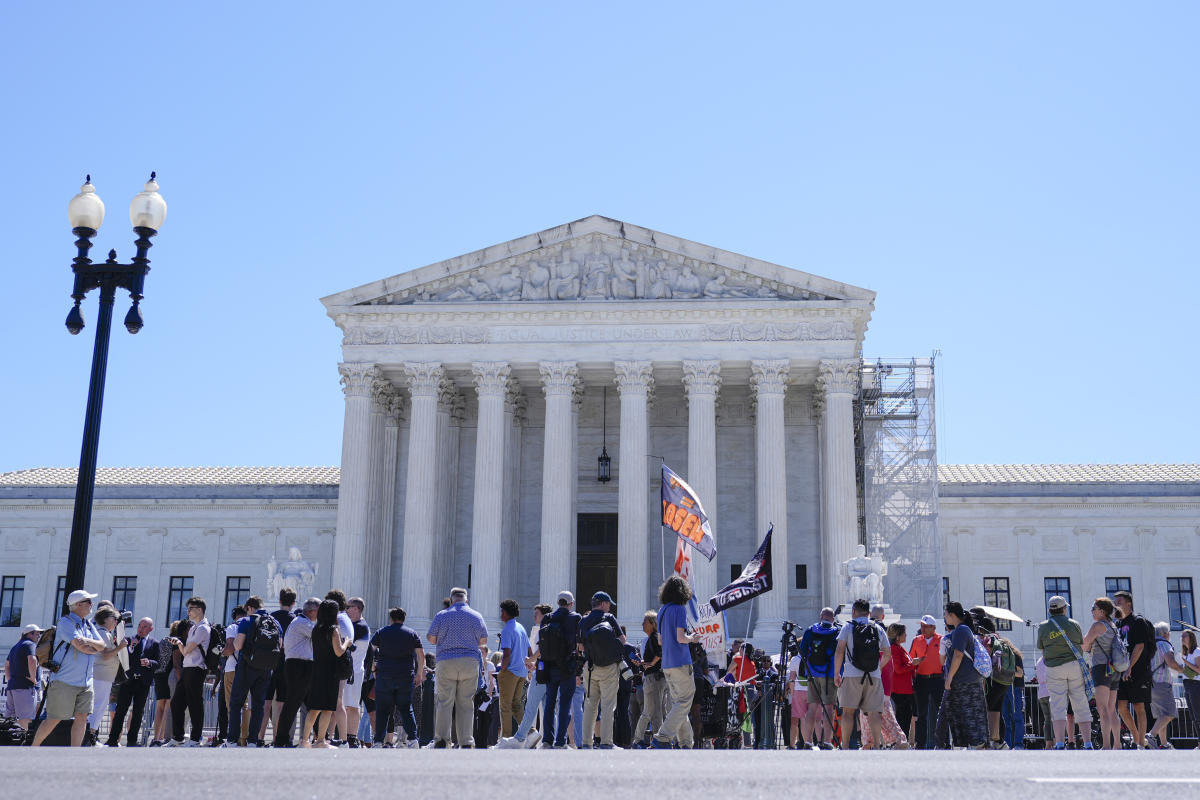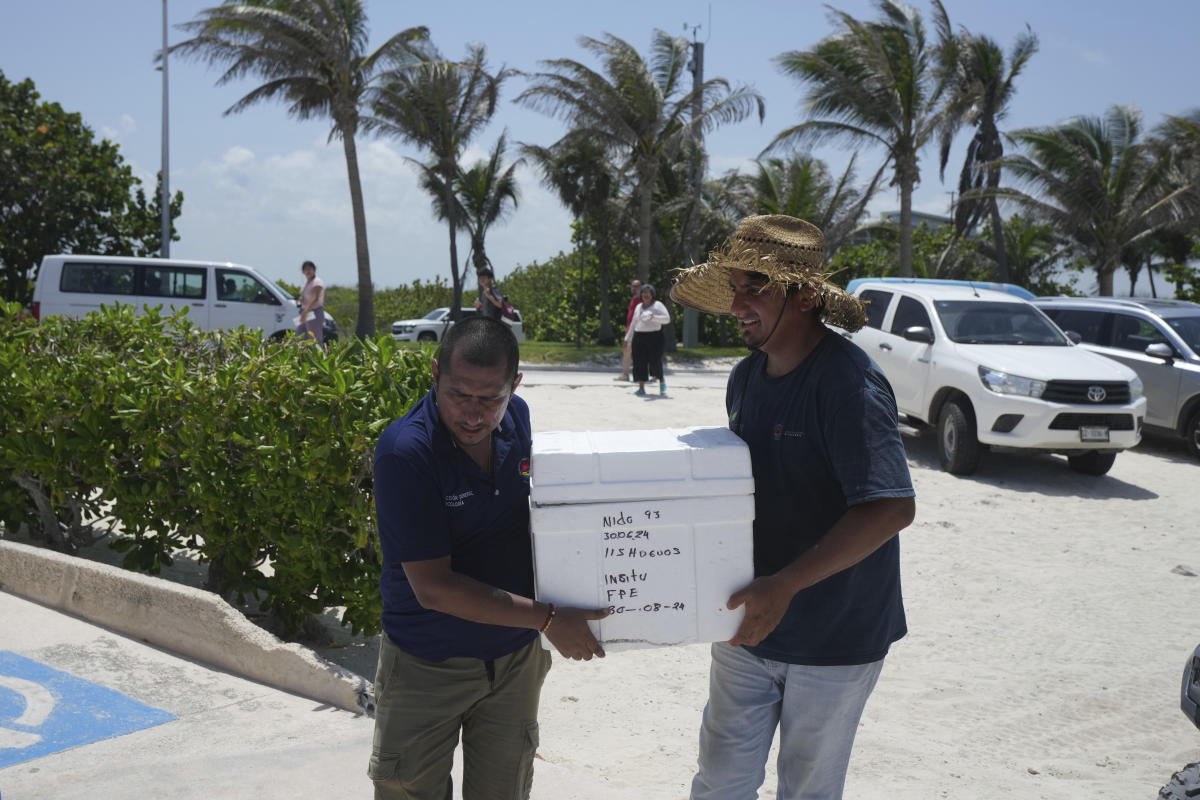A New York jury on Thursday found Donald Trump guilty of all 34 counts of falsifying corporate records – the first time a former US president has been convicted of a crime.
The jury reached its verdict in the landmark case after 9½ hours of deliberation, which began on Wednesday.
He will be sentenced on July 11, four days before the Republican National Convention. He faces penalties ranging from a fine to four years in prison on each charge, although he is expected to be sentenced for the offenses concurrently and not consecutively.
Follow live updates here.
“This was a shame. This was a rigged trial by a conflicted judge who was corrupt,” Trump told reporters afterward.
The verdict was read in the Manhattan courtroom, where Trump has been on trial since April 15. He pleaded not guilty to 34 counts of falsifying company records in connection with a hush-money payment his former attorney Michael Cohen made to adult film star Stormy Daniels in the case final weeks of the 2016 presidential election.
Trump looked down through narrowed eyes as the jury foreman read the word “guilty” on each count.
The judge thanked the jurors for their service during the weeks-long trial. “You have given this case the attention it deserves, and I want to thank you for that,” Judge Juan Merchan told them. Trump appeared to frown at the jurors as they walked past him on their way out of the courtroom.
Trump’s lawyer Todd Blanche filed a motion for acquittal after the jury left the room, which the judge denied.
Manhattan District Attorney Alvin Bragg declined to comment on what type of sentence he might seek, saying his office would discuss in court.
“While this defendant may be unlike any other in American history, at this trial and ultimately today, we reached this verdict the same way we reach every other case that comes before the courtroom – by examining the facts and the law to follow. without fear or favor,” Bragg said. Asked about his reaction to the verdict, Bragg, who was inundated with threats from Trump supporters during the investigation, said: “I did my job. We did our job.”
Trump, the presumptive Republican nominee for president, immediately began fundraising through the news, posting on his website that he was “a political prisoner” and urging his followers to give money.
Legal experts have told NBC News that even if Trump is sentenced to prison, he will most likely be allowed to stay out of jail while he appeals the verdict, a process that could take months or longer. That means the sentence would most likely not hinder his ability to accept the Republican nomination for president at the July convention.
And it probably wouldn’t affect his ability to get elected. “There are no qualifications other than those in the Constitution,” Chuck Rosenberg, a former U.S. attorney and NBC News & MSNBC Legal Analyst, said after Thursday’s ruling.
President Joe Biden’s campaign praised the verdict in a statement but stressed that Trump must be defeated in November.
“Today in New York we saw that no one is above the law,” said campaign communications director Michael Tyler, but “the verdict does not change the fact that the American people are faced with a simple reality. There is still only one way to keep Donald Trump out of the Oval Office: through the ballot box.”
In his closing arguments this week, prosecutor Joshua Steinglass told the jury that “the law is the law, and it applies to everyone equally. There is no special standard for this suspect.”
“You, the jury, have the ability to hold the defendant accountable,” Steinglass said.
Trump had insisted that the district attorney’s office had no case and that no crime had been committed. “President Trump is innocent. He has not committed any crime,” Blanche said in his closing statement, arguing that the payments to Cohen were legitimate.
Prosecutors said the disguised payment to Cohen was part of a “planned, coordinated, long-running conspiracy to influence the 2016 election, to help Donald Trump get elected through illegal spending, to silence people who do something bad.” had a say in his conduct, by using adulterated means.” company details and bank forms to hide those payments along the way.”
“It was election fraud. Pure and simple,” prosecutor Matthew Colangelo said in his opening statement.
Although Trump was not charged with conspiracy, prosecutors argued that he arranged for the records to be falsified because he was trying to cover up a violation of state election law — and falsifying company records with the intent to conceal another crime increases the crime from a misdemeanor to a misdemeanor.
Trump was convicted after a sensational, weekslong trial that included combative testimony from Cohen, Trump’s former fixer, and Daniels, who testified that she had a sexual encounter with Trump in 2006 after meeting him at a celebrity golf tournament. Trump has denied her claim, and his lawyer had suggested that Cohen only acted because he thought it would make “the boss” happy.
Other witnesses included former White House staffers including adviser Hope Hicks, former Trump Organization executives and former National Enquirer publisher David Pecker.
Trump has not used the witness stand to give his own account of what happened, even though he stated before the trial began that he would “absolutely” testify. The defense’s key witness was Robert Costello, a lawyer Cohen considered hiring in 2018. Costello, who testified that Cohen told him Trump had nothing to do with the Daniels’ payment, infuriated Merchan by making disrespectful comments and facial expressions on the stand. At one point, the judge cleared the courtroom during Costello’s testimony and threatened to hold him in contempt.
Cohen testified that he lied to Costello because he didn’t trust him and that he lied to others about Trump’s involvement at the time because he wanted to protect his former boss.
Cohen was the only witness to testify to Trump’s direct involvement in the $130,000 payment and subsequent repayment plan. Blanche spent days challenging his credibility, prompting Cohen to acknowledge that he has a history of lying, including under oath.
Cohen said he received that money, along with Daniels’ money, in a series of payments from Trump in 2017, which the Trump Organization characterized as payments under a retainer agreement “for legal services rendered.”
Prosecutors said no such agreement existed, and Cohen’s version of events was supported by documentary evidence and witness statements.
Pecker testified about a 2015 meeting with Trump and Cohen in which they asked him to be their “eyes and ears” on scandalous stories that could hurt Trump’s campaign, and he said he helped the pair break two such stories destroy. One involved a doorman who falsely claimed to have information about a Trump love child, and the other involved a former Playboy model named Karen McDougal, who claimed she had a months-long affair with Trump that began in 2006 began. Trump has denied McDougal’s claim: But Pecker said he believed it in part because Trump had described her to him as a “nice girl.”
Pecker’s company paid the doorman $30,000 and McDougal $150,000 for their silence.
Pecker said he was told Trump would pay back the $150,000, and Cohen secretly recorded Trump talking about the planned payment, which never happened.
Pecker testified that he also helped alert Cohen to Daniels’ story in October 2016, when Trump’s campaign was reeling from the release of the so-called “Access Hollywood” tape, in which Trump can be heard bragging about being able to grope women because he is famous. .
Blanche insisted to the jury that the series of checks then-President Trump paid to Cohen in 2017 “was not repayment to Mr. Cohen for the money he gave to Ms. Daniels” and that he was paid for his legal work as Trump’s lawyer. personal attorney.
Testimony from Jeff McConney, a former senior vice president at Trump’s company, disputed that view. McConney said Allen Weisselberg, the company’s chief financial officer, told him that Cohen was compensated for a $130,000 payment and the $50,000 payment, and that prosecutors entered Weisselberg’s handwritten notes on the payment formula into evidence. Cohen said Trump agreed to the arrangement during a meeting with him and Weisselberg just days before he was inaugurated as the 45th president.
Weisselberg did not testify. He is in jail on perjury charges related to his testimony in New York Attorney General Letitia James’ civil fraud case against Trump and his company. Cohen, McConney and other witnesses said Weisselberg, who worked for Trump for decades, always sought his approval for big spending.
In total, the prosecution called twenty witnesses, while the defense called two.
Trump had often falsely claimed that the charges against him were a political fabrication orchestrated by Biden to keep him off the campaign trail. But Trump eventually managed to take the campaign to the courtroom, where he defeated top Republicans, including House Speaker Mike Johnson of Louisiana and Sens. JD Vance of Ohio and Rick Scott of Florida, as his guests in the courtroom. Trump also used breaks in court to push political messages to his supporters, while his surrogates circumvented Merchan’s silence order by attacking witnesses, individual prosecutors and Merchan’s daughter.
Merchan fined Trump $10,000 at trial for violating his order, including attacks on Cohen and Daniels, and warned he could have him jailed if he continued to violate the order.
Trump was indicted in March last year after a years-long investigation by Bragg and his predecessor, Cyrus Vance. The charges were the first ever against a former president, although Trump has since been charged in three other cases and has pleaded not guilty. None of the three — a federal election interference case in Washington, D.C., a state election interference case in Georgia and a federal case alleging he mishandled classified documents and national security information — appear likely to go to trial before the Nov. 5 presidential election to come.
This article was originally published on NBCNews.com






